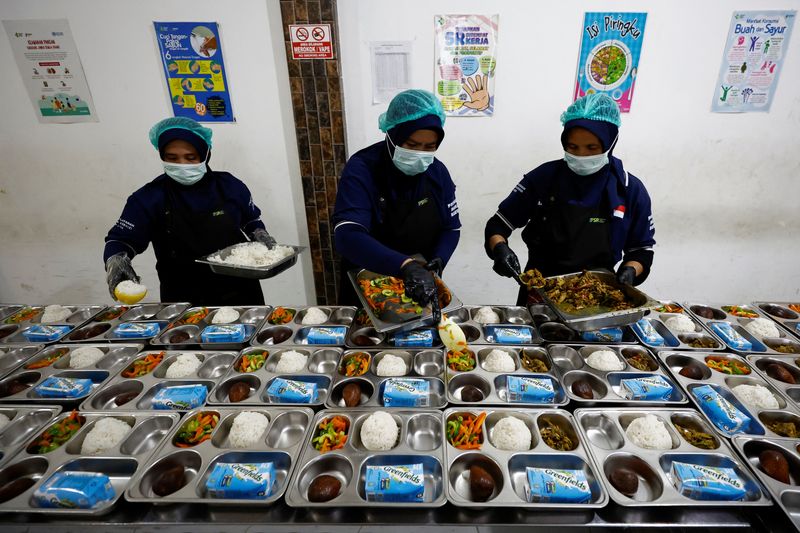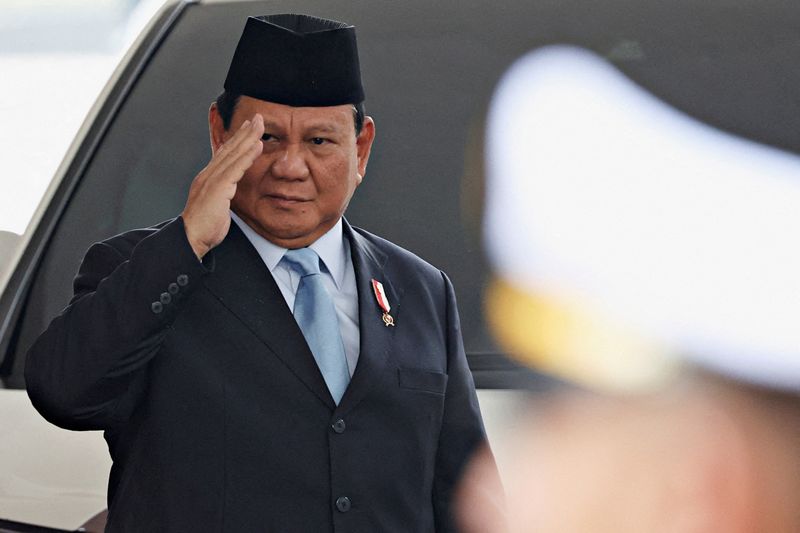By Dewi Kurniawati
SUKABUMI, Indonesia (Reuters) - Indonesian sixth-grader Shakila Fitriyani, a day labourer's daughter who dreams of becoming a doctor, says she is keener to go to school these days because she is served a free lunch.
"I am happy to receive the nutritious meal, milk and fruit," Shakila said, speaking in her small tiled-roof and bamboo-screened home in the green highlands of West Java.
"This has made me eager, going to school."
Since January, the 11-year-old has been among thousands of students receiving a mid-day meal - consisting, for example, of rice with a spiced, hard-boiled egg, stir-fried vegetables and a box of milk, along with a slice of melon.
They are part of a pilot programme in the province aiming to deliver on a campaign promise by incoming president Prabowo Subianto, an endeavour costing $28 million to supply meals to 83 million children and pregnant women nationwide.
But the effort has drawn criticism from investors and rating agencies questioning how it could be funded without hurting Indonesia's recent hard-won reputation for fiscal prudence, while logistics offers a challenge in the sprawling archipelago.
Prabowo, who will take office on Sunday from incumbent Joko Widodo, says the programme is essential to fight the stunting of growth that afflicts 21.5% of children under five and can be delivered within the limits of fiscal prudence.
To allay budget concerns, Prabowo has limited the first year's expenditure to 71 trillion rupiah ($4.6 billion) so as to keep the annual fiscal deficit under a legislated ceiling of 3% of GDP.
But Eliza Mardian, an economist with think-tank the Center of Reform on Economics, said the budget might not be enough, particularly as milk, which Indonesia imports, is expensive.
"With our tight fiscal condition, there is potential for budget swelling and this will lead to additional debt," she said. "This will be a fiscal burden for us going forward."
If the programme requires more imports of food, she warned it could also worsen the external balance of payments for Indonesia, already a major importer of wheat, rice, soybeans, beef and dairy products.
On the other hand, Prabowo calls the programme one of the main drivers of economic growth, eventually set to add an estimated 2.5 million jobs and spur demand for local produce.
The president-elect has pledged to accelerate GDP growth to 8% from 5% now.
BUSY KITCHENS
To ensure the wider meals campaign rolls out by January, Prabowo, now the defence minister, asked Widodo's administration in August to set up a new National Nutrition Agency, headed by Dadan Hindayana, the chief of his meals programme.
In the beginning, 3 million students will receive meals, with the number expected to double by April and reach 15 million by July, Dadan told reporters this month, with at least 5,000 kitchens to be set up across the country.
They are likely to be modelled on dozens of pilot kitchens that tested the concept for months.
Since the start of this year, one kitchen in the West Java town of Sukabumi has employed about 50 people as cooks, food suppliers, drivers, and dish washers to make 3,300 meals for 20 schools every day.
Activity begins before dawn, as fresh meals are made to a menu designed monthly by a certified nutritionist to maximise use of locally-sourced ingredients, said kitchen manager Pahmi Idris, on a budget of 15,000 rupiah a meal.
School employees are helping to track how the meals affect the height and weight of the students, who usually sit cross-legged on the floor to eat out of segmented metal trays.
But the pilot showed an early task for the programme would be to convince children to eat vegetables, Pahmi said, as these, uneaten, formed the bulk of wasted food.
"We know that children don't like vegetables," Pahmi said. "We need to educate them more about eating vegetables."
Indonesia's diverse communities and varied geography could also make it challenging to set up kitchens nationally, said analyst Izzudin Al Farras Adha of the Jakarta-based Institute for Development of Economics and Finance.
Experts have also said that better food for school-age children comes too late to resolve stunting, which requires complex remedies from improved sanitation and hygiene to better nutrition for mothers.
But the programme's benefits were real, said Sukabumi residents.
Roby Nurdin, a supplier of fruit and vegetables, said the kitchen operation had doubled his income and benefited farmers.
And more students are turning out for class, said Lastri Samtiawati, a teacher in Shakila's school, which gets its meals from the Sukabumi kitchen.

"Students are more active," she added. "I now understand the direct impact of good nutrition for children."
($1=15,635 rupiah)
